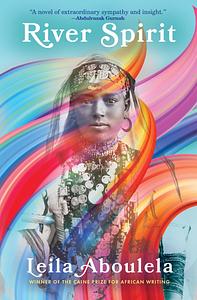You need to sign in or sign up before continuing.
Take a photo of a barcode or cover
4.5⭐️
A captivating story about the Turkish and British occupation of Sudan, this novel highlights themes of womanhood, religious fanaticism, slavery, and various forms of freedom—especially for the character Zamzam, who is sold from one person to another, with the river serving as her only true anchor and place of refuge. I particularly enjoyed the narrative style, each chapter follows a different character’s perspective, offering their unique account of events. This structure isn’t easy to pull off, but Aboulela handles it seamlessly, allowing the story to unfold beautifully.
A captivating story about the Turkish and British occupation of Sudan, this novel highlights themes of womanhood, religious fanaticism, slavery, and various forms of freedom—especially for the character Zamzam, who is sold from one person to another, with the river serving as her only true anchor and place of refuge. I particularly enjoyed the narrative style, each chapter follows a different character’s perspective, offering their unique account of events. This structure isn’t easy to pull off, but Aboulela handles it seamlessly, allowing the story to unfold beautifully.
adventurous
challenging
dark
emotional
hopeful
reflective
medium-paced
Plot or Character Driven:
A mix
Strong character development:
Yes
Loveable characters:
Complicated
Diverse cast of characters:
Yes
Flaws of characters a main focus:
Yes
informative
medium-paced
Loveable characters:
Complicated
Diverse cast of characters:
Yes
Flaws of characters a main focus:
No
At the beginning of the year, I read "Arresting God in Kathmandu", and I remember telling a friend how I didn't like the format of a lose set of perspectives that's only slightly intervowen.
Now that I read River Spirit (and A General Theory of Oblivion), I just think I didn't like Arresting God in Kathmandu very much, because in River Spirit, it worked supremely well. All the perspectives had some sort of connection and it never felt like they were chosen at random.
I really loved the way the setting was portrayed, and I'm a sucker for historical fiction that comes with source material.
And, as someone who doesn't do well with war literature, this wasn't unbearably upsetting. Bad things happened, but never in a way that felt too graphic or too much like they were just there for shock value.
Now that I read River Spirit (and A General Theory of Oblivion), I just think I didn't like Arresting God in Kathmandu very much, because in River Spirit, it worked supremely well. All the perspectives had some sort of connection and it never felt like they were chosen at random.
I really loved the way the setting was portrayed, and I'm a sucker for historical fiction that comes with source material.
And, as someone who doesn't do well with war literature, this wasn't unbearably upsetting. Bad things happened, but never in a way that felt too graphic or too much like they were just there for shock value.
challenging
emotional
reflective
slow-paced
Plot or Character Driven:
Plot
Strong character development:
Yes
Loveable characters:
Yes
Diverse cast of characters:
Yes
Flaws of characters a main focus:
Yes
adventurous
reflective
sad
medium-paced
Plot or Character Driven:
Plot
Strong character development:
Yes
Loveable characters:
Yes
Diverse cast of characters:
Yes
Flaws of characters a main focus:
Complicated
The main character is an orphan who is enslaved.
The story is descriptive without graphically describing the violence in the story.
Historical fiction.
The story is descriptive without graphically describing the violence in the story.
Historical fiction.
adventurous
challenging
emotional
informative
reflective
tense
medium-paced
Plot or Character Driven:
A mix
Strong character development:
Yes
Loveable characters:
Complicated
Diverse cast of characters:
Yes
Flaws of characters a main focus:
Complicated
slow-paced
challenging
informative
slow-paced
Plot or Character Driven:
A mix
Strong character development:
Complicated
Loveable characters:
Complicated
Diverse cast of characters:
Yes
Flaws of characters a main focus:
No
adventurous
challenging
informative
inspiring
medium-paced
Plot or Character Driven:
Character
Strong character development:
Yes
Loveable characters:
Complicated
Diverse cast of characters:
Yes
Flaws of characters a main focus:
Yes
A beautifully written story about a period that was crucial in Sudanese history. That could mislead you into thinking it's about war and leaders, and while people like the Mahdi and British General "Chinese" Gordon are crucial to it, this is not their story. Instead, it's about a variety of women and men, mostly Muslim although in quite different ways, and how they navigate love and faith in a time of increasing violence.
It's refreshing to me after reading various perspectives from the U.K. and the U.S. to read one that's truly from a Sudanese perspective. The author also manages to express the viewpoints of both women and men in ways that ring true. Even when you don't like a character (like Robert), they are not cardboard villains but people you would recognize if you could travel back in time to the 1880's and meet them in the marketplace.
The book could use a glossary.
It's refreshing to me after reading various perspectives from the U.K. and the U.S. to read one that's truly from a Sudanese perspective. The author also manages to express the viewpoints of both women and men in ways that ring true. Even when you don't like a character (like Robert), they are not cardboard villains but people you would recognize if you could travel back in time to the 1880's and meet them in the marketplace.
The book could use a glossary.
adventurous
challenging
emotional
informative
medium-paced
"In case of defeat, God forbid, when all is lost and the only choice is surrender, when the enemy says join our cause or you will perish, what is the right thing to do?"
River Spirit is a brilliant historical fiction set in 1980's Sudan, during the Mahdist War against the Ottoman-Egyptian rule and the meddling of the British colonial forces in the country.
When a false Mahdi, a self-proclaimed Messiah, emerges from the population, his words inspire countless to rise up under his command and rid Sudan of its foreign occupiers by whatever means necessary.
Using distinct character perspectives from multiple sides of the war, Leila Aboulela weaves together a rich and complex depiction of the deep impact religious and political upheavals have on society. Through vivid storytelling, we witness how families are divided from the inside, friendships are put to the test, and how everyone, but particularly women and girls, are forced to make harrowing sacrifices during times of unrest.






